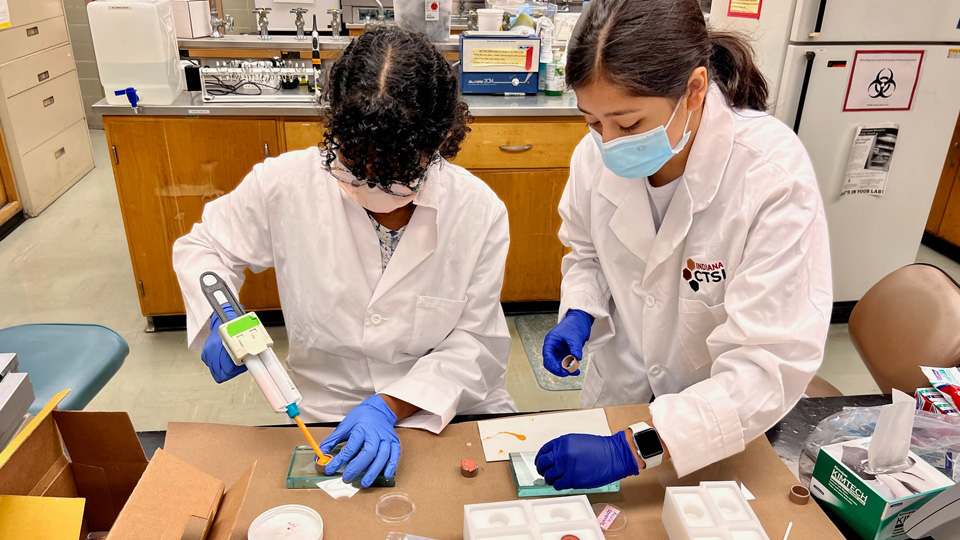New smile motivates Project SEED student
Subscriber Benefit
As a subscriber you can listen to articles at work, in the car, or while you work out. Subscribe Now
When residents at the Indiana University School of Dentistry helped restore a young Mexican immigrant’s smile nearly a decade ago, they unknowingly inspired her to now do the same for others. Daniela Flores, a junior at North Central High School in Indianapolis, is one of many students in the Indianapolis Project SEED (Summer Experience for the Economically Disadvantaged) program. Previously ashamed of her smile that needed significant orthodontic work, Flores now has plenty to grin about; she got her braces off just days ago, and the summer internship is opening the door to her dream of becoming an orthodontist.
Flores immigrated when she was nine years old and didn’t have any dental care during her first four years in the U.S.; in her early teen years, she started receiving care at the IU School of Dentistry (IUSD). She says her baby teeth took longer than typical to fall out, so her adult teeth overlapped and grew in out of place.
“I was really self-conscious about my smile growing up, especially with my family. When I moved to the U.S., my [extended family] didn’t know me very well, but they always made fun of my smile, which really affected my self-image,” says Flores. “Having my teeth fixed at the School of Dentistry really helped me. I’m so, so happy with the results; I’m very confident when I smile now. I really want to help other people who also have that problem.”
Through a series of connections that took root when she was a patient at IUSD, Flores is now one of three students interning at the school through Project SEED, a program within the Indiana Clinical and Translational Sciences Institute (CTSI). The summer internship program places disadvantaged high school students in academic and professional research labs as they earn a $2,500 stipend. The American Chemical Society established the nationwide program in 1968, and Indianapolis Project SEED is a standout; it’s the largest and longest-running program in the U.S. CTSI also leads Indianapolis Project STEM for students from all backgrounds.
Training alongside PhD students and post-doctoral students, Flores is learning high-level techniques used in an academic research lab. Her project involves running experiments to compare two restorative materials commonly used to fill cavities.
“When you get cavities, they take [the decay] out and fill the space with two kinds of material called resin composite and glass ionomer. We want to see which one is better in simulated mouth conditions,” says Flores. “Without this program, I don’t think I would’ve ever had the opportunity to work [in such a high-tech lab] and work with doctorate students. I’m really thankful for that.”
“[The SEED students] are running these experiments with help from a PhD student and a post-doc, but they’re the ones running the experiments; it’s their own, so they’ll be able to present that data,” says IUSD Associate Professor Dr. Simone Duarte. “I know most of the children in our area don’t have a lab where they can go and learn. Being able to show them that—it can be a life-changing thing for these kids. It’s one of the most beautiful programs I’ve been involved in.”
Perhaps even more powerful than time in the lab is the mentorship students receive. Flores was surprised to work with many IUSD clinicians and faculty with colorful ethnicities like her own. Duarte, Clinical Assistant Professor Dr. Sabrina Sochacki, PhD candidate Dr. Giovanna Denucci and post-doctoral research fellow Dr. Beatriz Panariello are all from Brazil, and Dr. Mona Amhemed Arrageg is from Libya.
“It’s a lot of diversity, which I didn’t realize,” says Flores, who will be a first-generation college student in her family. “Coming from a low-income family, you don’t know a lot of people who have had [college] experiences, so they become like your mentors for life. Networking with the people at IU is really rewarding, because after the end of the program, you can still reach out to them and ask about their experiences.”
“These students are smart. Extremely smart,” says Duarte. “This is my first time working with these high school students, and it has been one of the most rewarding experiences for me; they’re so eager to learn and take advantage of this opportunity. We have to give these kids opportunities, so they can give back something for our own community.”
As for Flores, she aspires to become an orthodontist and help others who are economically disadvantaged—and that’s certainly something to smile about.
Duarte says she’s moved by the students’ stories and their motivations for learning.
